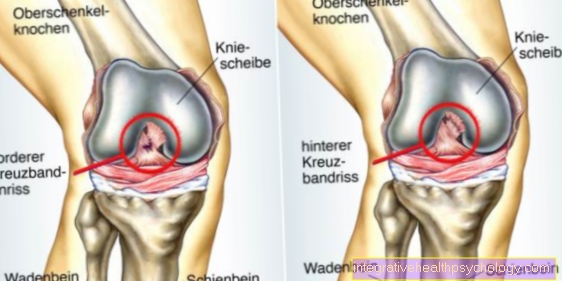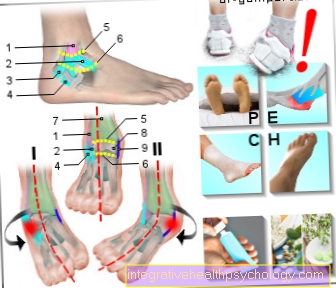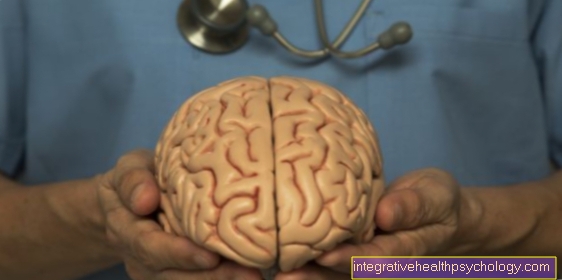Early intervention
Definition - what is early intervention?
Early intervention is a collective term for various educational and therapeutic measures to support physically or mentally handicapped children or children who develop very slowly.
Early intervention promotes children from birth to school age and is intended to help prevent developmental disorders and alleviate the possible consequences of disabilities. These include, for example, language training, visual training and physiotherapy.

Who should get early intervention?
Every child whose development is slow or noticeable can receive early intervention. The pediatrician is usually the first point of contact.
If you start early intervention in good time, you can often mitigate or even remedy possible consequences for the children. This is because a lot can still be influenced in the early stages of development. If a child is threatened with a disability, this enables us to positively influence the disability, prevent possible consequences or even prevent an impending disability.
Indications that early intervention is necessary are:
-
a child cannot hear properly
-
a child cannot see properly
-
a child does not learn to speak properly
-
a child lags behind in intellectual development
-
a child has physical defects or
-
a child behaves very abnormally psychologically
Children who are cognitively, physically or emotionally impaired in their development should receive an early challenge.
Read also under: U-examinations at the pediatrician
When does early intervention make sense?
Early intervention makes sense if a child has cognitive, physical or psychological impairments. Early intervention is useful if you have a disability. At the same time, it is worth asking early for children who are still at risk of becoming disabled. With the right support, these children can possibly be helped so that the disability does not develop, or at least less so.
This means that early intervention can help to mitigate and prevent possible harm in a child's various impairments. With early intervention you can help to "help" a handicapped child in the development as much as possible.
This topic could also be of interest to you: Behavioral problems in children
Can I "promote" my child myself?
You can already contribute to promoting the development of the child during pregnancy. A healthy lifestyle promotes the development of the embryo. After that, breastfeeding and a healthy diet help to positively influence the child's brain development. A healthy relationship with both parents also has a positive effect on child development.
If the child is curious and asks questions, encourage this by answering questions and awakening interests in a playful way. When children learn independently and repeat knowledge and, for example, communicate this to their cuddly toys, the children benefit from it.
Another important point is social contacts. The child can be encouraged early on by organizing play groups, play appointments and checking whether the child feels comfortable in their kindergarten group or class. All these aspects can be promoted as parents and thus the mental development of the child.
Professional early intervention makes sense if the child suffers from the first impairments. If the pediatrician prescribes early intervention, the early intervention is completely free of charge for the child and the parents, as the health insurance company will then cover the costs. A disabled child benefits from a stable, loving home and early support through professional help.
Learn more at:
- Child Development - What is Normal?
- What is a developmental problem?
What does early intervention look like in kindergarten?
There are so-called integrative kindergartens in which physically and mentally handicapped children are supported in small groups together with non-handicapped children. Dealing with other children of the same age should promote the development of all children.
An integrative kindergarten should give disabled children the feeling that they are no different and that they belong. In these small groups, all children learn to show acceptance, tolerance, patience and consideration.
Early intervention in kindergarten can consist of physiotherapy and speech therapy. The therapy options differ greatly in different kindergartens with early intervention. In order to find the right group for your child, you should do thorough research and compare kindergartens.
You might also be interested in:
- Kindergarten - you should know that!
- Montessori kindergarten
What exercises for early intervention are there?
There are various early childhood learning exercises that are designed to help children develop.
Special educational exercises can be rhythmic and musical exercises, psychomotor exercises or, for example, perception and sensory exercises.
In one hour of psychomotor skills, for example, basic children's functions can be promoted, such as running, balancing, climbing or sliding. You can improve your sense of balance by jumping on the trampoline. The children develop a control of their balance and strengthen their muscles.
The game "A little snail" is an exercise for language development and body awareness. The child lies on its stomach and the supervisor recites the poem and carefully guides the hand "like a snail" over the child's back. In addition, there are many language games such as "When the miller has burned" or "Rain", which help the child to train the speech rhythm.
Depending on the child's impairment, there are various ways to playfully train the child's deficits.
Recommendations from the editorial team
You might also be interested in the following topics:
- Behavioral problems in children
- Poor concentration
- Speech disorder
- Visual disturbances in the child
- U-examinations at the pediatrician
















-mit-skoliose.jpg)












